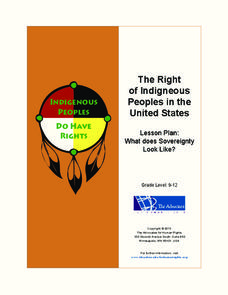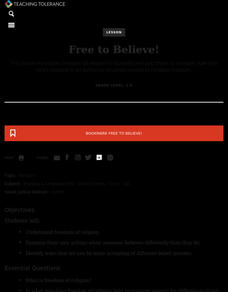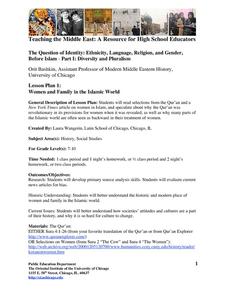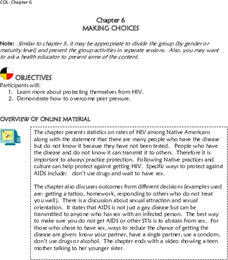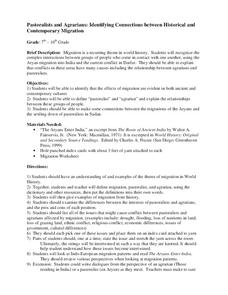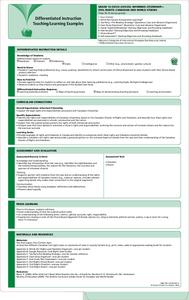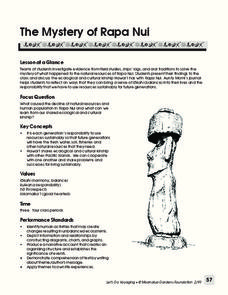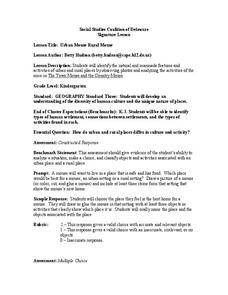Advocates for Human Rights
The Right of Indigneous Peoples in the United States
The sovereignty of U.S. Native American nations is the focus of a resource that asks class members to compare the Right to Self-Determination in the UN Declaration on the Rights of Indigenous Peoples with a fact sheet that details the...
Stanford University
Annexation of Hawaii
Once an independent nation, Hawaii became part of the United States only after a business-sponsored coup of its queen. After examining newspapers from the 1890s, learners consider whether native Hawaiians wished to become Americans at...
Teaching English
In Flanders Fields
War is one of the most profound human experiences in history, and is often best depicted in works of art and literature. Introduce class members to the poetry of World War I with this resource that uses John McCrae's "In Flanders Fields"...
Teaching Tolerance
Racial Disparity in the Criminal Justice System
Explore the impact of the war on drugs in a thought-provoking lesson for high school academics. Young historians delve into the world of the criminal justice system and the racial disparity that occurs in the US. The resource provides...
Teaching Tolerance
Understanding the Prison Label
Break the chain. An engaging lesson examines why it is so hard to break free of the prison system in the US. Academics participate in a reader's theater, read primary sources, and discuss their thoughts. The lesson explains the hardships...
Facing History and Ourselves
Insights on Democracy from South Africa
As part of their study of democracy, high schoolers listen to a podcast featuring two South African educators and their efforts to support the process of transforming the nation from apartheid rule into a democracy. Learners also read...
Teaching Tolerance
Free to Believe!
The United States: One nation with countless religions. An interesting lesson focuses on the freedom of religion protected under the First Amendment. Academics learn why it is important to protect all religions, why there is a separation...
Curated OER
Indigenous Peoples’ Day Lesson Plan
Indigenous Land Guardianship, Settler Colonialism, Racial Capitalism. While the terms may be new to some, they feature in a lesson plan designed for Indigenous Peoples' Day. Young scholars investigate four concepts: Land...
Chicago Botanic Garden
Introducing Ecosystem Services
Ecosystems provide many things humans not only use but also need in order to survive. The last activity in the series of seven introduces scholars to the idea of ecosystem services, that ecosystems provide humans with many things we...
Curated OER
Tears of Joy Theatre Presents Anansi the Spider
Accompany the African folktale, Anansi the Spider, with a collection of five lessons, each equipped with supplemental activities. Lessons offer multidisciplinary reinforcement in English language arts, social studies, science, and arts...
University of Chicago
Women and Family in the Islamic World
How does the Qur'an detail the role of women? What modern social issues are linked to Islamic law? Address these questions with your young historians through close analysis of primary and secondary source documents.
Facing History and Ourselves
How Do Rules and Traditions Shape Communities?
Sixth graders explore the concepts of laws and customs in a community, examining the reasoning behind rules. Then then collaborate to write their own classroom code of conduct.
School Improvement in Maryland
Demographic Investigation
What are the factors that influence voting patterns? How do these factors influence government funding? Is participation the squeaky wheel gets the grease? Class members interpret graphs and analyze trends to determine what demographic...
Healthy Native Youth
Chapter 6: Making Choices
A lesson looks closely at risky behavior such as teen pregnancy and sexually transmitted diseases. Middle schoolers use a question box to ask questions anonymously. They role-play what life would be like if they became pregnant then...
Curated OER
Pastoralists and Agrarians: Identifying Connections between Historical and Contemporary Migration
Pastoralists and agrarians, livestock raisers and farmers. Using the conflict in Darfur as a lens, class members investigate the conflicts that arise when these groups are forced to migrate from one area to another.
Ontario
Informed Citizenship—Civil Rights
To launch a study of civil rights, class members brainstorm rules and expectations of behaviors at home, in school, in the workplace, and in sports. They then look at civil rights cases and examine the rules embedded in these cases.
NOAA
I Can't Breathe!
The Gulf of Mexico dead zone, an area of low oxygen that kills marine life, costs the United States $82 million every year. Young scientists research anoxic ocean environments then come up with a hypothesis for the cause of the Gulf of...
Earth Day Network
The Neolithic Revolution
With the abundance of food products we can easily access in our society today, it is easy to forget the toll this can take on our global environment. Young learners will discover how the transition to agriculture and domesticated living...
Moanalua Gardens Foundation
The Mystery of Rapa Nui
What caused the collapse of the environment on Rapa Nui (Easter Island)? Who constructed the Moai? What was their purpose? Class members assume the role of investigators and use evidence drawn from field studies, ships' logs, and...
Maine Content Literacy Project
Dramatic Structure of the Short Story
The second instructional activity in a series of fourteen, this plan takes the short story basics a step further. Learners complete a quiz about the story from the previous day, discuss the text, learn about Anton Chekhov, and work in...
Social Studies Coalition of Delaware
Urban Mouse Rural Mouse
Explore rural and urban environments over the course of four days. Each day offers a new look into how both environment compare and contrast. Activities include the observation and analyzation of images, a read aloud and grand discussion...
Vermilionville
Mardi Gras Elementary
You don't have to visit Vermilionville to experience the Cajun traditions of Mardi Gras. After examining pictures and hearing stories about these colorful traditions, learners create their own Courir de Mardi Gras masks.
Curated OER
Introduction to Ludwig van Beethoven
"Ode to la Tortilla" and "Ode to Joy"? Sure! Use Gary Soto's poem to introduce learners to the ode format. After examining the descriptive words Soto uses, class members study a poster of Ludwig van Beethoven, suggest words that describe...
Advocates for Human Rights
Deliberative Dialogue
How do you create a classroom environment where hot button topics may be discussed in a respectful manner? As part of a series of lessons that focus on immigration issues, class members examine the rules for civil discussion before...


